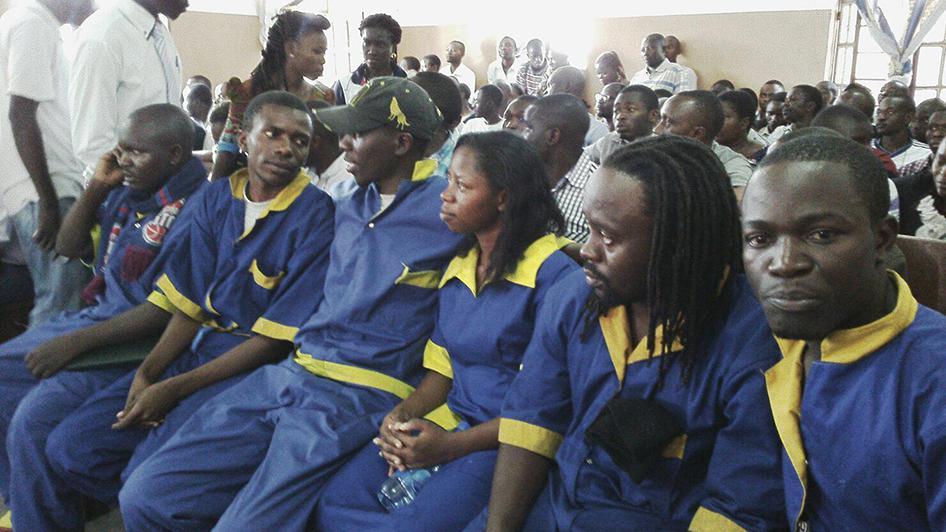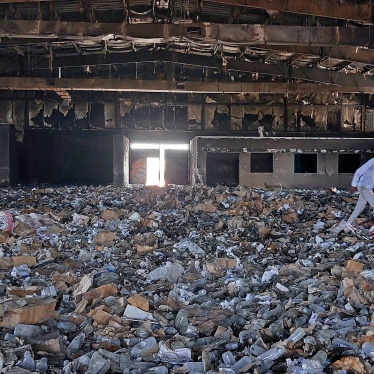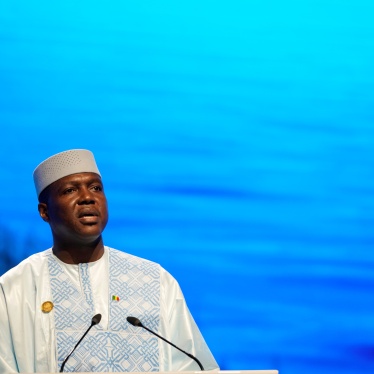(Kinshasa, February 23, 2016) – Democratic Republic of Congo authorities have arbitrarily arrested eight youth activists, Human Rights Watch said today. The youth activists and at least 30 political opposition supporters were detained on or around February 16, 2016, in connection with a national strike, or “ville morte” (dead city), to protest delays in organizing presidential elections. Other activists who supported the ville morte have received text message threats from unknown phone numbers.
“Peaceful protest is not a crime, and the Congolese authorities should immediately release all those wrongfully arrested or detained on trumped up charges,” said Ida Sawyer, senior Africa researcher at Human Rights Watch. “These latest arrests are part of a growing crackdown on opponents of the government’s attempts to delay elections and extend the president’s term in office.”
At about 4:30 a.m. on February 16, in the eastern city of Goma, police entered the office of an organization where youth activists had been working through the night preparing banners for the national strike. One of the banners read, “In 2016, we won the [African Nations (football) Championship’s] Cup; we can also win democracy.”
The police arrested Rebecca Kavugho, Serge Sivya, Justin Kambale, John Anipenda, Ghislain Muhiwa, and Melka Kamundu, all members of the Struggle for Change (La Lutte pour le Changement, LUCHA) citizens’ movement.
The six were taken to the P2 police station in Goma, where they were questioned without a lawyer present. The police also confiscated two laptops, six cell phones, and the banners. When Human Rights Watch visited the activists that evening in detention, one of them had a deep cut on his upper left arm incurred during the arrest.
About midday on February 17, two-dozen university students in Goma gathered in front of the P2 police station, peacefully protesting the arrests. They held signs that read: “We demand the release of our colleagues arrested yesterday and detained here.” About 20 police officers quickly dispersed the protesters, arresting and beating several of them. While most were released within a few hours, one student was held overnight. He later told Human Rights Watch that a police officer at P2 beat him with the barrel of his gun, injuring his right ear. The police then transferred him to a jail at the mayor’s office. He was released the next day, without charge, after his family paid US$30.
Shortly after the police station demonstration, the police transferred the six LUCHA activists to the prosecutor’s office. There they were charged with associating with criminals and attempting to incite revolt – charges that appear to be politically motivated, Human Rights Watch said.
Their trial began on February 18, at Goma’s High Court (Tribunal de Grande Instance) for charges flagrante delicto – for allegedly being “caught in the act.” The activists’ lawyers contended that the chamber had lost its jurisdiction because it can only hear cases within 48 hours of the alleged act. At a hearing the next day, all the police officers except one who had been called in to testify about the arrests failed to appear in court. The judges then decided to hear the case during regular proceedings, instead of for charges flagrante delicto, where a verdict would have been required immediately.
In the capital, Kinshasa, two other LUCHA activists, Bienvenu Matumo and Marc Héritier Kapitene, were reported missing from a hotel in Bandal commune early in the morning on February 16. At about 5:40 a.m. one of the activists sent a text message to a friend saying “arrested.” The previous evening, they had attended a meeting with other LUCHA activists to prepare for the strike. Just after the meeting, Victor Tesongo, a member of an opposition political party who had met with the LUCHA activists at the end of their meeting, was arrested on his way home.
The three remained missing until February 19, when they were transferred from a national intelligence agency (Agence Nationale de Renseignements, ANR) detention center to the prosecutor’s office. Until then, they were unreachable by phone, and their families and colleagues were not able to find them. They were first held at the provincial police commissioner’s prison, then transferred to the ANR on February 18. Human Rights Watch had contacted security officials to ask about the missing activists, but the officials did not confirm the arrests or provide information on the activists’ whereabouts, raising concerns of forced disappearances.
During a hearing at the prosecutor’s office in Kinshasa’s Gombe commune on February 20, Matumo, Kapitene, and Tesongo were put under a provisional arrest warrant on charges of incitement to civil disobedience, spreading false information, and attacking state security.
LUCHA activists told Human Rights Watch they believe the police have been closely monitoring their activities since at least November 2015, when security officials brutally repressed a peaceful demonstration the movement organized in Goma. During that demonstration, two LUCHA activists and seven other people were arrested. They remain in detention and are on trial on trumped-up charges.
“Congolese authorities seem determined to repress free speech and peaceful protest in Congo,” Sawyer said. “Concerned governments should press Congo to immediately free the peaceful protesters it’s holding and end its political repression.”
For details about other arrests and the ville morte, please see below.
Additional Arrests
Human Rights Watch also received credible reports that more than 30 political opposition members and supporters were detained on or around February 16. While some might have been involved in burning tires in the streets, many others appear to have been arrested merely for peacefully supporting or encouraging others to observe the ville morte. Some were released after their families bribed the police or after UN human rights officials intervened.
On February 14, security officials arrested an opposition leader and member of parliament, Martin Fayulu, and detained him at the military intelligence headquarters in Kinshasa. He had been involved in mobilizing participation in the national strike. He was released seven hours later without charge.
In Kinshasa’s Masina commune, eight people were arrested on February 16 when a small group of people had peacefully gathered in support of the ville morte, chanting “Yebela” (“be warned” in Lingala), in reference to the president being near the end of his term. When the protesters were arrested, the police put them in the back of a police pickup, demanded to know the political parties they belonged to, and took them to the Masina police station jail, one of the detainees said. He and many of the others were released the next day after their families paid the police about $200 each.
Three women said that on the morning of February 16, in Kinshasa’s Ngaliema commune, the police badly beat them and forced them into the back of a police pickup. The women said they just happened to be on the side of the road when young men were burning tires. They were released later that evening without charge. One of the women’s leg was injured during the arrest, and she now has difficulty walking.
In Uvira, South Kivu province, on the morning of February 16, security officials arrested a lawyer and local opposition spokesman for the Union pour la Nation Congolaise (UNC) political party, Francois Yuma Kaziga. Kaziga told Human Rights Watch that before he was arrested, an acquaintance had stopped him on the road to tell him that the local ANR director had told him to inform Kaziga that he needed to change his clothes and wear different colors; he was wearing red and white, the UNC party colors.
Kaziga said that he was stopped by armed soldiers in uniform who forced him into their jeep. They took him to the ANR office and interrogated him about his political party affiliation, his position, and why he was wearing red and white. Later that evening, they transferred him to a local police jail. He was released the next afternoon, without charge.
Several activists who had supported the ville morte told Human Rights Watch that they had received text message threats from unknown phone numbers in the days before and after the ville morte. One message said, “We are going to prove to you how much trouble we can cause. Your family members and loved ones are at our doorstep and will be harassed one after another.” Another message said, “Young man, you’re bothering us. This is your last warning.”
The “Ville Morte” Strike
Since January 2015, Congolese security and intelligence officials have clamped down on peaceful activists, political leaders, and others who oppose attempts to allow President Joseph Kabila to stay in power past his constitutionally mandated two-term limit, which ends in late 2016. Plans for presidential elections, due to be held in November, have been deliberately stalled and Kabila has yet to declare publicly that he will step down at the end of his term.
Leaders from Congo’s main opposition parties, nongovernmental organizations, and pro-democracy youth movements called on Congolese citizens to stay home from work and school on February 16, for the ville morte in commemoration of those killed during a pro-democracy march on February 16, 1992, and to protest the delays in elections and the government’s alleged failure to respect the constitution.
The ville morte was largely observed in Kinshasa, with many schools, shops, and businesses closed, and the usual traffic-jammed streets largely empty, despite government officials’ efforts to make it a normal work day. Employment Minister Willy Makiashi issued a statement on February 15, prohibiting public employees from participating in the strike and warning that attendance would be taken with consequences for those absent from work. Other government officials echoed his warning. Many of Congo’s other cities also observed the ville morte to varying degrees.
On the morning of the strike, a coalition of 135 Congolese human rights organizations published a news release calling on authorities to respect the right to demonstrate peacefully. They alleged that the authorities have “tried to keep the population in fear by banning or brutally repressing public meetings and demonstrations, and arresting the participants they wrongly accused of instigating trouble, regardless of the nature of their demands.”
In the early hours of February 16, the signal of Radio France International, one of the most listened-to radio stations in Congo, was cut in an apparent attempt to disrupt the strike. It was restored at the end of the day. In January 2015 government authorities had similarly blocked radio signals, text messages, and Internet services during mass demonstrations across the country.









